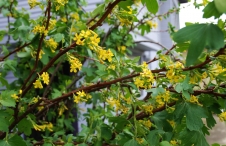Yarrow
Common yarrow (Achillea millefolium) is found throughout Nevada, and has a long history of food and medicinal uses. Old folk names for yarrow include field hops, devil's nettle, milfoil, old man's mustard, woundwort, and yerw.
Most Indian groups in Nevada have been known to use yarrow in both food and for medicinal purposes, particularly the Shoshone and Paiute Indians. As a powerful healing herb, yarrow was used most often as a topical agent for injuries. These remedies included boiling the plant to make poultices for wounds on both people and animals, especially for healing saddle sores on horses. Additionally, yarrow was used as a treatment for fever, earaches, toothaches, and headaches. When dried, the crushed leaves have a “minty” flavor and are occasionally used in teas. The teas are used to relieve fever, pain, and to aid in restful sleep. As a member of the Asteraceae family, yarrow is closely related to chamomile. Yarrow leaves can also be used as a sage substitute in stews. Steaming the flowers produces anti-allergenic compounds used for various allergic problems, including hay fever.
Common yarrow is native to the northern hemisphere and has a wide geographical distribution. It is a perennial plant, is extremely drought tolerant, and has several subspecies, one of which (Achillea millefolium) is found commonly growing throughout the sagebrush steppe, which includes the majority of the state of Nevada. It flourishes in sunny and warm habitats, yet has a relatively short life span.
Individual yarrow plants usually grow more than 1 foot tall, often producing several stems. The small heads of the plants crowd into a flattened dome, umbrella-like cluster. One of the most significant characteristics of yarrow is its odor, most particularly the crushed leaves. The whole herb, or above-ground parts, of the yarrow plant is used for medicinal purposes, including the flowers, leaves, and stems and is collected for medicinal uses while it is in bloom.
Yarrow is said to get its scientific name (Achillea millefolium) from the Greek warrior Achilles, who presumably used extracts from the plant to treat the wounds of his soldiers in the battle of Troy. Today, yarrow is valued mainly for its action in colds and influenza, as well as for its effect on the circulatory, digestive, and urinary systems.



